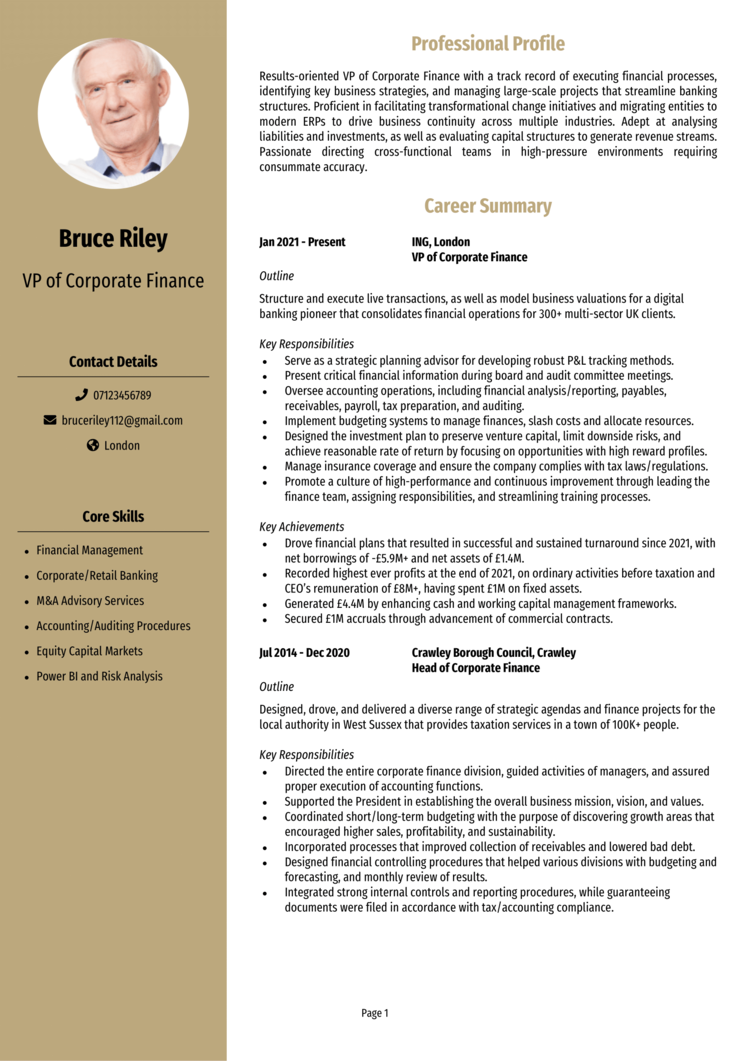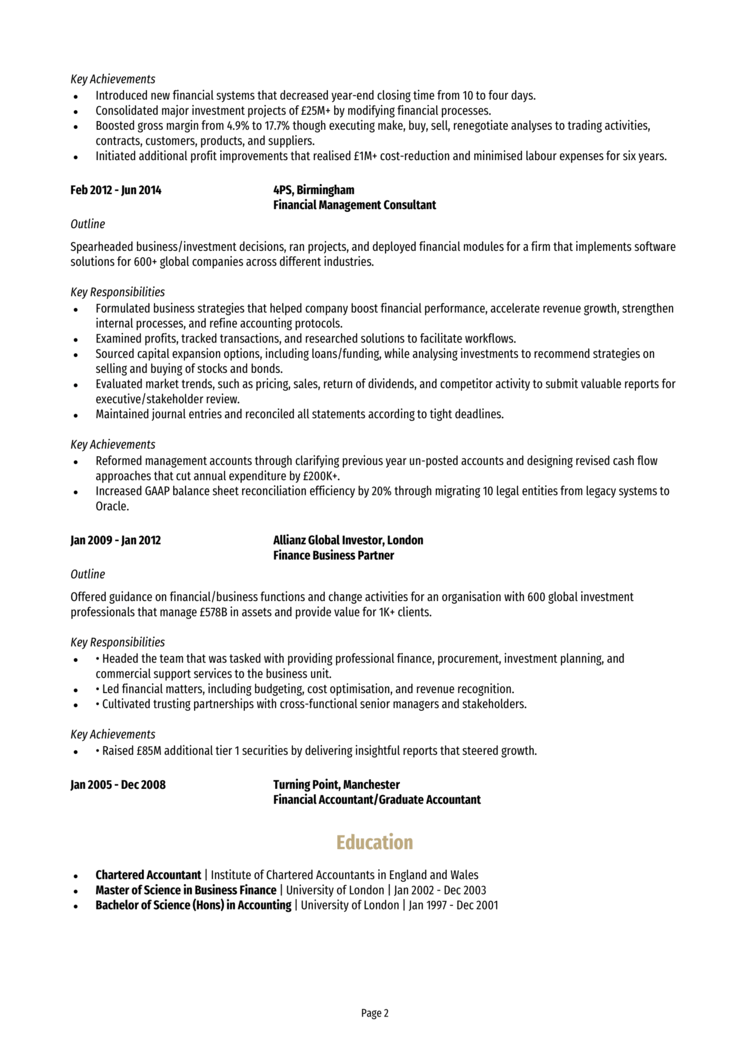The world of corporate finance is competitive and vibrant, and you could find yourself doing anything from managing accounts to balancing corporate budgets.
Corporations need their hires to have strong problem solving skills, critical thinking skills, and plenty of experience managing budgets small and large.
If you want your knowledge and experience to speak for itself, use our corporate finance CV example below for tips on writing a winning CV.
|
Corporate Finance CV example
This is a good example of a Corporate Finance CV which is professionally formatted, and structured in a way that allows recruiters to easily find and understand the candidate’s key selling points.
Take some time to look at this CV and refer to it throughout the writing of your own CV for best results.


Corporate Finance CV structure & formatting
Recruiters and employers are busy, and if they can’t find the information they’re looking for in a few seconds, it could be game over for your application.
You need to format and structure your CV in a way which allows the reader to pick out your key information with ease, even if they’re strapped for time.
It should be clear, easily legible, well-organised and scannable – check out some simple tips and tricks below:
How to format your CV
- Length: Think that submitting a five page CV will impress recruiters? You’re wrong! Even if you’ve got tons of experience to brag about, recruiters don’t have time to read through overly detailed CVs. Keep it short, concise and relevant – a CV length of 2 sides of A4 pages or less is perfect.
- Readability: By clearly formatting your section headings (bold, or a different colour font, do the trick) and breaking up big chunks of text into snappy bullet points, time-strapped recruiters will be able to skim through your CV with ease.
- CV design: Your CV needs to look professional, sleek and easy to read. A subtle colour palette, clear font and simple design are generally best for this, as fancy designs are often harder to navigate.
- Photographs: Don’t add profile photos to your CV unless you work in an industry or region which prefers to see them. Most employers in the UK will not need to see one.
Quick tip: Creating a professional CV style can be difficult and time-consuming when using Microsoft Word or Google Docs. To create a winning CV quickly, try our quick-and-easy CV Builder and use one of their eye-catching professional CV templates.
CV structure
When writing your own CV, break up your CV content into the following key sections:
- Name and contact details – Place them at the top of your CV, so that employers can easily get in touch.
- CV profile – A punchy sales pitch of your key experience, skills and achievements to reel readers in.
- Core skills section – A bullet-pointed snapshot of your abilities.
- Work experience – A well-structured list of your relevant work experience.
- Education – An overview of any relevant qualifications or professional training you have.
- Hobbies and interests – A short description of any relevant hobbies or interests (optional).
Now, let’s take a closer look at what you should include in each section of your CV.
CV Contact Details
Tuck your contact details into the corner of your CV, so that they don’t take up too much space.
Stick to the basic details, such as:
- Mobile number
- Email address – It should sound professional, such as your full name.
- Location -Just write your rough location, rather than your full address.
- LinkedIn profile or portfolio URL – If you include these, ensure they’re sleek, professional and up-to-date.
Corporate Finance CV Profile
Recruiters and hiring managers are busy, so it’s essential to catch their attention from the get-go.
A strong introductory profile (or personal statement, for junior candidates) at the top of the CV is the first thing they’ll read, so it’s a great chance to make an impression.
It should be a short but punchy summary of your key skills, relevant experience and accomplishments.
Ultimately, it should explain why you’re a great fit for the role you’re applying for and inspire recruiters to read the rest of your CV.
CV profile writing tips:
- Make it short and sharp: Aim for a short, snappy paragraph of 3-5 lines. This is just enough room to showcase why you’d make the perfect hire, without going into excessive detail and overwhelming busy recruiters.
- Tailor it: If recruiters don’t see your suitability within a few seconds, they may close your CV straight away. Your CV profile should closely match the essential requirements listed in the job ad, so make sure to review them before you write it.
- Don’t add an objective: Avoid discussing your career goals in your CV profile – if you think they’re necessary, briefly mention them in your cover letter instead.
- Avoid generic phrases: Focus on fact, not fluff. Phrases like “Committed and enthusiastic thought-leader” and “Dynamic problem solver” might sound fancy, but they’ll do nothing for your application. Not only do they sound cheesy, but they have no substance – stick to real skills and facts
Example CV profile for Corporate Finance
What to include in your Corporate Finance CV profile?
- Summary of experience: To give employers an idea of your capabilities, show them your track record by giving an overview of the types of companies you have worked for in the past and the roles you have carried out for previous employers – but keep it high level and save the details for your experience section.
- Relevant skills: Employers need to know what skills you can bring to their organisation, and ideally they want to see skills that match their job vacancy. So, research your target roles thoroughly and add the most important Corporate Finance skills to your profile.
- Vital qualifications: If the jobs you are applying to require candidates to have certain qualifications, then you must add them in your profile to ensure they are seen by hiring managers.
Quick tip: If you are finding it difficult to write an attention-grabbing CV profile, choose from hundreds of pre-written profiles across all industries, and add one to your CV with one click in our quick-and-easy CV Builder. All profiles are written by recruitment experts and easily tailored to suit your unique skillset.
Core skills section
Next, you should create a bullet pointed list of your core skills, formatted into 2-3 columns.
Here, you should focus on including the most important skills or knowledge listed in the job advertisement.
This will instantly prove that you’re an ideal candidate, even if a recruiter only has time to briefly scan your CV.
Vital skills for your Corporate Finance CV
Corporate Financial Management – managing sources of funding used to raise capital to create, develop and/or acquire a business.
M&A Advisory Services – managing the consolidation of assets through financial transactions including raising funds.
Accounting/Auditing Procedures – utilising GAAP approving accounting and auditing procedures to record and ensure the accuracy of the company’s financial information.
Equity Capital Markets – working with a broad network of financial institutions, channels, and markets that together assist companies to raise capital.
Power BI – utilising data visualisation software to display data/financial insights.
Quick tip: Our quick-and-easy CV Builder has thousands of in-demand skills for all industries and professions, that can be added to your CV in seconds – This will save you time and ensure you get noticed by recruiters.


Your work experience section
Recruiters will be itching to know more about your relevant experience by now.
Kick-start this section with your most recent (or current) position, and work your way backwards through your history.
You can include voluntary and freelance work, too – as long as you’re honest about the nature of the work.
Structuring each role
Whilst writing your CV, it’s essential to look at it from the eyes of a recruiter.
If they’re met with giant blocks of text which are impossible to navigate, they might get frustrated and skip onto the next CV.
Instead, make use of the 3-step structure shown below, to give them a pleasant reading experience.
Outline
Firstly, give the reader some context by creating a punchy summary of the job as a whole.
You should mention what the purpose or goal of your role was, what team you were part of and who you reported to.
Key responsibilities
Follow with a snappy list of bullet points, detailing your daily duties and responsibilities.
Tailor it to the role you’re applying for by mentioning how you put the target employer’s desired hard skills and knowledge to use in this role.
Key achievements
Finish off by showcasing 1-3 key achievements made within the role.
This could be anything that had a positive effect on your company, clients or customers, such as saving time or money, receiving exemplary feedback or receiving an award.
Sample job description for Corporate Finance CV
Outline
Structure and execute live transactions, as well as model business valuations for a digital banking pioneer that consolidates financial operations for 300+ multi-sector UK clients.
Key Responsibilities
- Serve as a strategic planning advisor for developing robust P&L tracking methods.
- Present critical financial information during board and audit committee meetings.
- Oversee accounting operations, including financial analysis/reporting, payables, receivables, payroll, tax preparation, and auditing.
- Implement budgeting systems to manage finances, slash costs and allocate resources.
Quick tip: Create impressive job descriptions easily in our quick-and-easy CV Builder by adding pre-written job phrases for every industry and career stage.
Education and qualifications section
In your education section, make any degrees, qualifications or training which are relevant to Corporate Finance roles a focal point.
As well as mentioning the name of the organisation, qualification titles and dates of study, you should showcase any particularly relevant modules, assignments or projects.
Hobbies and interests
The hobbies and interests CV section isn’t mandatory, so don’t worry if you’re out of room by this point.
However, if you have an interesting hobby, or an interest that could make you seem more suitable for the role, then certainly think about adding.
Be careful what you include though… Only consider hobbies that exhibit skills that are required for roles as a Corporate Finance, or transferable workplace skills.
There is never any need to tell employers that you like to watch TV and eat out.


Writing your Corporate Finance CV
An interview-winning CV for a Corporate Finance role, needs to be both visually pleasing and packed with targeted content.
Whilst it needs to detail your experience, accomplishments and relevant skills, it also needs to be as clear and easy to read as possible.
Remember to research the role and review the job ad before applying, so you’re able to match yourself up to the requirements.
If you follow these guidelines and keep motivated in your job search, you should land an interview in no time.
Best of luck with your next application!











